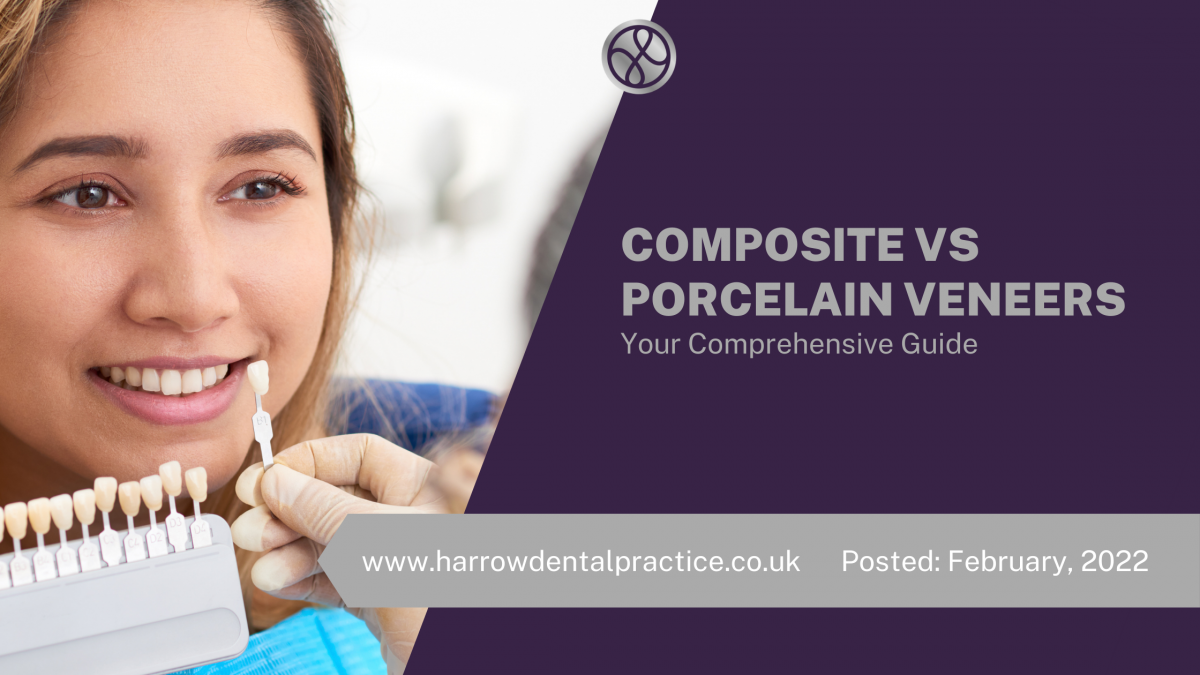If you crooked, chipped, or permanently stained teeth, veneers are one of the most aesthetically pleasing, durable, and time-tested options. However, while searching for veneers over the internet, you might have come across terms such as “porcelain veneers” and “composite veneers”, and you might be wondering what is the difference between these two types of veneers. The purpose of this article is to provide a comprehensive overview of dental veneers, and to explain their different types. So. continue reading to find out everything you need to know about veneers.
What Are Dental Veneers? What Are Its Types And Benefits?
According to the British Academy of Cosmetic Dentistry, a veneer is an ultra-thin shell of porcelain or composite resins. Veneers are attached to the front surfaces of the teeth and are used for masking tooth defects or to restore structural damage in teeth. Generally, there are two main types of veneers; porcelain and composite veneers. Both types of veneers are fabricated in the dental laboratory, and each has its own merits and demerits.
How Do Dental Veneers Work?
A veneer works as a mask or covering for the teeth, and helps in hiding various cosmetic and structural tooth defects. Your dentist will remove a thin layer of the outer enamel of the damaged tooth. This is done to create space for bonding the veneers. The prepared veneers are then bonded to the tooth using adhesive.
What Are The Pros And Cons Of Dental Veneers?
Veneers are an increasingly popular procedure for treating cosmetic dental issues. Some of the pros and cons of veneers include:
- Pros of Dental Veneers
-
-
- Can be used for smile makeovers
- Superior aesthetics than bonding
- More durable than composite fillings – can last for up to 15 years
- Boost one’s self-confidence
- Less expensive than crowns
-
- Cons of Veneers
-
- Require sacrificing healthy tooth structure for their attachment
- Stains on veneers cannot be removed through professional whitening
Do Composite Veneers Ruin Your Teeth?
Composite veneers are made from the same material used for cosmetic bonding. After preparing the damaged teeth, your dentist will make impressions of your teeth and send them to the laboratory. The technician will then use composite resin to prepare the veneers. Although composite veneers are less durable and stain-resistant than porcelain veneers, it is not correct to say that they can ruin one’s teeth. Composite resins are safe for use in the oral cavity, and can even be repaired if they get cracked or partially chipped.
What Are Porcelain Veneers?
Porcelain veneers have the same design as composite veneers. However, the only difference is that they are prepared using high-quality, tooth-coloured dental porcelains. Compared with composite veneers, porcelain veneers are more durable and last longer.
Do Composite Veneers Look Natural?
In short, yes. Both porcelain and composite veneers are prepared from tooth-coloured materials. Dental technicians can precisely match the shade and colour of the composite veneers to that of your natural teeth. As a result, composite veneers blend in perfectly with the natural teeth and become virtually indistinguishable, giving a natural look. Composite veneers appear even more realistic than direct composite fillings.
How Long Do Veneers Last Before They Need To Be Replaced?
The service life of veneers depends on various factors, such as their type and oral hygiene status. While composite veneers may last around 5 years, porcelain veneers are stronger and more durable. With proper oral hygiene care, you can expect your porcelain veneers to last for up to 15 years, even longer. To extend the service life of your veneers, you should avoid eating hard and sticky foods, as they may crack or dislodge them.
How Are Veneers Made And Applied To Teeth?
The fabrication and attachment of veneers are usually carried out in 2 sittings. In the first appointment, your dentist will remove a thin layer of the outer tooth enamel to create room for the attachment of the veneers. This is known as tooth preparation. Don’t worry; tooth preparation will not make your teeth sensitive, as an ultra-thin layer of the natural tooth structure will be removed. After preparing the teeth, your dentist will make their impression and send it to the dental laboratory for fabrication. Your dentist will first try your prepared veneers on your teeth at the next appointment without bonding them. If the fit and aesthetics are found acceptable, they will bond the veneers to your teeth using an adhesive. Congratulations! You are now the owner of a brand-new, charming smile.
What Should You Know Before Getting Veneers?
Dental veneers are an excellent option for treating cosmetic dental problems. However, it is always better to prefer porcelain veneers over composite-based veneers, as they are aesthetically more pleasing, durable, and more stain-resistant. At the same time, porcelain veneers are not suitable for individuals having a deep bite or those who have a habit of grinding teeth excessively. This is because porcelain is very hard, and when it contacts the opposing tooth, it may cause it to wear quickly – leading to complications such as teeth sensitivity and tooth decay. Your dentist will recommend a suitable veneer material after a careful clinical examination.
Dental veneers are an excellent option if looking for a complete smile makeover. If you have cosmetic defects that prevent you from smiling or speaking in public, Harrow Dental Practice is the solution to your problems. Our experienced and qualified dentists can help you get rid of your cosmetic tooth defects, and enjoy a beautiful smile that you have always dreamed of. So, request a free virtual appointment today and take your first step towards a confident and charming smile.

